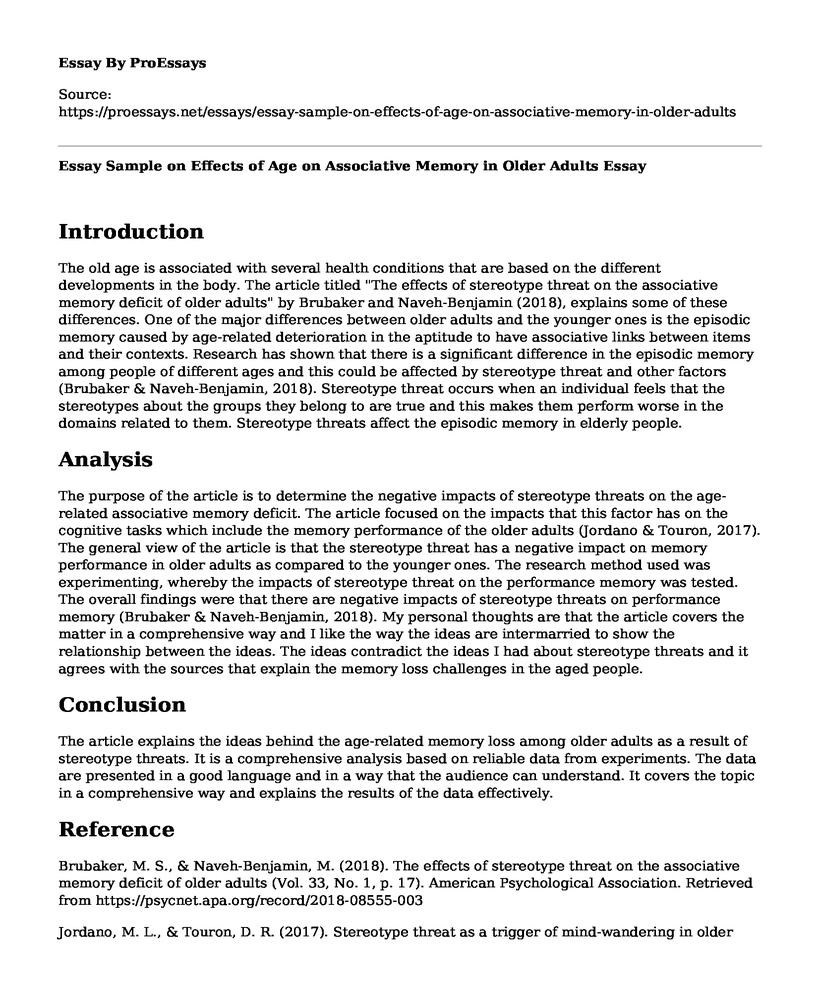Introduction
The old age is associated with several health conditions that are based on the different developments in the body. The article titled "The effects of stereotype threat on the associative memory deficit of older adults" by Brubaker and Naveh-Benjamin (2018), explains some of these differences. One of the major differences between older adults and the younger ones is the episodic memory caused by age-related deterioration in the aptitude to have associative links between items and their contexts. Research has shown that there is a significant difference in the episodic memory among people of different ages and this could be affected by stereotype threat and other factors (Brubaker & Naveh-Benjamin, 2018). Stereotype threat occurs when an individual feels that the stereotypes about the groups they belong to are true and this makes them perform worse in the domains related to them. Stereotype threats affect the episodic memory in elderly people.
Analysis
The purpose of the article is to determine the negative impacts of stereotype threats on the age-related associative memory deficit. The article focused on the impacts that this factor has on the cognitive tasks which include the memory performance of the older adults (Jordano & Touron, 2017). The general view of the article is that the stereotype threat has a negative impact on memory performance in older adults as compared to the younger ones. The research method used was experimenting, whereby the impacts of stereotype threat on the performance memory was tested. The overall findings were that there are negative impacts of stereotype threats on performance memory (Brubaker & Naveh-Benjamin, 2018). My personal thoughts are that the article covers the matter in a comprehensive way and I like the way the ideas are intermarried to show the relationship between the ideas. The ideas contradict the ideas I had about stereotype threats and it agrees with the sources that explain the memory loss challenges in the aged people.
Conclusion
The article explains the ideas behind the age-related memory loss among older adults as a result of stereotype threats. It is a comprehensive analysis based on reliable data from experiments. The data are presented in a good language and in a way that the audience can understand. It covers the topic in a comprehensive way and explains the results of the data effectively.
Reference
Brubaker, M. S., & Naveh-Benjamin, M. (2018). The effects of stereotype threat on the associative memory deficit of older adults (Vol. 33, No. 1, p. 17). American Psychological Association. Retrieved from https://psycnet.apa.org/record/2018-08555-003
Jordano, M. L., & Touron, D. R. (2017). Stereotype threat as a trigger of mind-wandering in older adults. Psychology and Aging, 32, 307-313. Retrieved from http://dx.doi.org/10.1037/pag0000167
Cite this page
Essay Sample on Effects of Age on Associative Memory in Older Adults. (2023, Jan 25). Retrieved from https://proessays.net/essays/essay-sample-on-effects-of-age-on-associative-memory-in-older-adults
If you are the original author of this essay and no longer wish to have it published on the ProEssays website, please click below to request its removal:
- Health Care Technologies - Essay Example
- Effects Of Temperature And Culture On Medium
- Disability, Complexity and Intersectionality, Reflection and Personal Identity Paper Example
- Essay Example on Family Connections Theory: Interdependence and Emotional Strength
- Essay Example on Mediation: A Beneficial Dispute Resolution Method
- Essay Sample on Nurses and SDLC: Essential for Effective EHIS Acquisition
- Essay on Dynamic Macronutrient Approach: A Nutrition Expert's Tool for Individualized Eating







